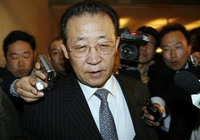Israel still refuses to put its nuclear program under international purview
Israel was criticized at 144-nation atomic energy conference for not putting its nuclear program under international purview.

Besides Washington, only Israel voted against the resolution while 53 nations backed it and 47 abstained.
The remaining nations were absent for the highly unusual vote - only the second in the 16 years the issue has been on the agenda of the International Atomic Energy Agency.
Up to last year, the resolution on "Application of IAEA Safeguards in the Middle East" had been adopted by consensus, but in 2006, and again this year, Israeli objections forced a vote.
This year, Israel opposed two paragraphs - one calling all nations in the Middle East "not to develop, test or otherwise acquire nuclear weapons," the other urging nuclear weapons states to "refrain from any action" hindering the establishment of a Mideast zone free of nuclear weapons.
Both passages were clearly aimed at Israel, which is considered to have nuclear weapons despite its "no tell" policy on the issue and which counts on the United States as its chief ally for support - both in the outside world and in forums such as the conference.
Israeli opposition last year was sparked by a separate Arab-sponsored resolution deeming Israel a "nuclear threat" and refusal by its sponsors to withdraw it.
While that resolution was put up for adoption it was not voted on. A similar resolution was being prepared for consideration at the gathering Friday.
A Western diplomat whose country normally is supportive of Israel sought to diminish the negative impact of the vote, pointing out that last year, 98 approved the resolution, with three abstaining and the United States and Israel opposed.
Still, although the conference has no decision-making powers, the lack of consensus reflected deepening tensions in the Middle East.
Evidence that that Israel has nuclear arms is overwhelming, much of it based on details and pictures leaked in 1986 by Israeli nuclear technician Mordechai Vanunu. His revelations have been added to by other leaks, research, and by statements made by Israeli leaders that stopped just short of confirming Israel's status as a weapons state.
Israel's doctrine of "nuclear ambiguity" - never formally confirming or denying that it has such weapons - is meant to scare potential enemies from considering an annihilating attack while denying them the rationale for developing their own nuclear deterrent.
Explaining his call for a vote, chief Israeli delegate Gideon Frank suggested lack of willingness to remove resolution language his country objected to showed there was "no interest in consensus" by Egypt, which submitted the document and the other nations most in support - Arab countries and Iran.
"The way to build security ... is to aim high but start modestly and move carefully ahead," Frank told delegates, arguing - as every year - that distrust in the region had to be dismantled slowly before sweeping measures like a Middle East nuclear-free zone could be established.
Subscribe to Pravda.Ru Telegram channel, Facebook, RSS!





